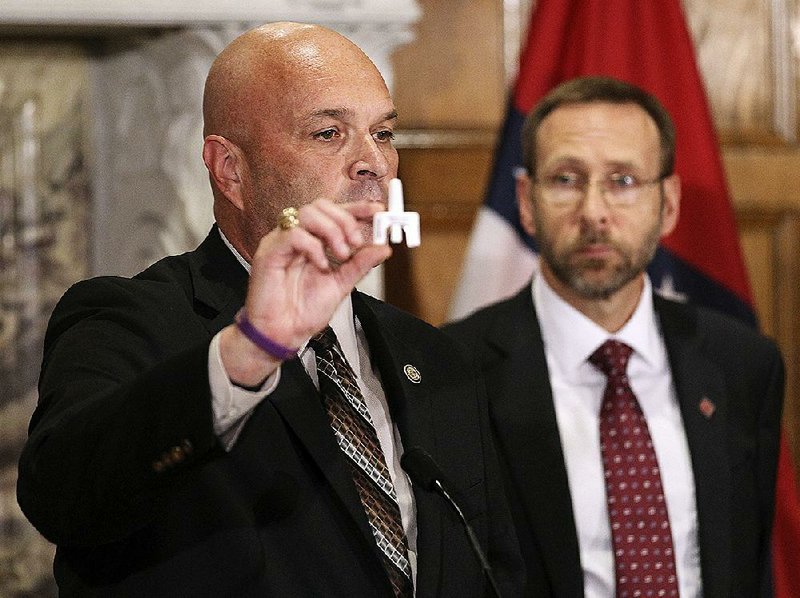Arkansans can now buy the lifesaving drug naloxone without a prescription at pharmacies across the state -- thanks to a new law intended to curb fatal opioid overdoses.
Naloxone brings back an overdose victim from the brink of death, buying extra time -- about 30 to 90 minutes -- for the victim to get needed medical attention before the respiratory system shuts down entirely.
The measure will help Arkansas take on the "growing challenge" of opioid misuse, Gov. Asa Hutchinson said during a Wednesday news conference at the state Capitol.
Opioid abuse "should be considered an emergency," Hutchinson said. "There are a lot of consequences down the road that we want to avoid. ... We've seen the danger signs."
Naloxone had required a prescription until this "protocol" was approved by lawmakers during the recent Legislative session. In more recent years, local municipalities began equipping their police forces and other first responders with the drug.
At the conference, state drug director Kirk Lane said that officers reported saving 12 overdose victims using naloxone between December 2016 and September. The new prescribing protocol allowing open access to naloxone will be "momentous" in saving lives, Lane added.
It is not clear exactly how significant drug abuse and the related death toll are in Arkansas. Data at clearinghouses like the Centers for Disease Control and Prevention or the National Institute on Drug Abuse do not always match each other or what is posted in state-kept reports.
Methamphetamine is still considered the most abused drug in the state, according to the governor, but prescription opioid overdoses have claimed at least 163 lives in 2014 and another 191 the following year, CDC data show.
Arkansas authorities also worry that opioid addiction will lead to a staggering jump in heroin use, a pattern that has emerged in several other states, especially in urban centers. The state Prescription Drug Monitoring Program, established in 2011, has made it more difficult for opioid users to go from doctor to doctor to collect opioid prescriptions. State law requires that pharmacists and doctors check a patient's information through the monitoring database before filling or writing a prescription for opioids. The program also has helped law-enforcement track down so-called "pill mills."
Hutchinson and other state officials referred to the increased access to naloxone as a "temporary fix," just one part of a larger effort to tackle opioid-related deaths.
A $3 million, five-year federal grant awarded to the state Department of Human Services will bolster officials' efforts to combat opioid misuse.
The 2016 grant required creation of a "comprehensive drug overdose program." Law enforcement agencies will receive naloxone and training on how to administer the drug. The grant will also back treatment clinics that focus on the use of Suboxone, a narcotic that is supposed to help opioid users fight addiction.
Officials also acknowledge that the price of a single dose of naloxone, $75 to $100, may be too steep for low-income residents.
"This could be an issue for some people who are afraid they cannot afford it," said John Kirtley, executive director of the state Board of Pharmacy. "It is also why Arkansas is working diligently through our law enforcement and first responders to ensure its availability when you call for emergency help."
He added: "No single approach is going to solve the opioid crisis in Arkansas."
Metro on 09/07/2017
